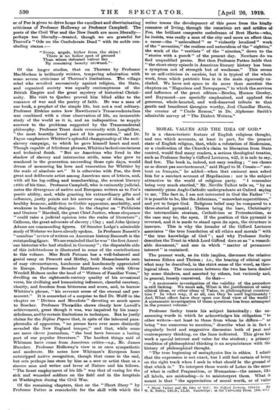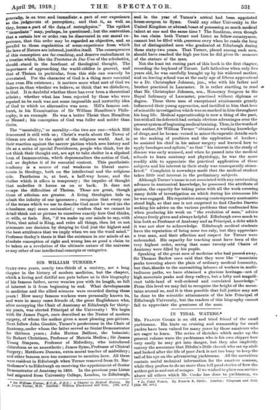MORAL VALUES AND THE IDEA OF GOD.•
Iv ie a characteristic feature of English religious thought, and one which accounts, at least in part, for the present state of English religion, tbat„while a refutation of Modernism, or- a vindication of the Church's claim to liberation from State control, would' find many readers, a serious theological treatise, such as Professor Sorley's Gifford Lectures, will, it is safe to say. find few. The book is, indeed, not easy reading ; " cea chows ne se disent pas suecinctement," said Hegel to M. Cousin—" sur- tout en franerds," he added—when that eminent man asked him for a succinct account of Hegelianient : nor is the subject attractive to the world of religious- party. " I remember being very much startled," Mr. Neville Talbot tells us, " by an eminently pious Anglo-Catholic undergraduate at Oxford saying to me, ' The fact is, I am not-interested in God-the Father' " : it is possible to be, like the Athenians, " somewhat:superstitious," and yet to forget God. Religious belief may be compared to a three-storied pyramid;: Theism being the base, Christianity the intermediate stratum, Catholicism or Protestantism, as the ease may be, the apex. If the position of this pyramid is reversed, and it is made to stand upon its apex, the structure is insecure, This is why the founder of the Gifford. Lectures associates " the true foundation of all ethics and morals " with " the true knowledge of God " ; and why Professor Sorley describes the-Trust in which Lord Gifford does so as " a Tweak- able document," and one in which " matter of permanent interest " is contained: The present work, as its title implies, discusses the relation between Ethics and. Theism ; i.e., the bearing of ethical upon what may be described, in the strict sense of the word, as theo- logical ideas. The connexion between the two has been denied by some thinkers, and asserted by others, but variously and, in general, loosely conceived. So that—.
", A systematic investigation of the validity of the procedure is-still lacking. We must ask, What is the justification of using ethical ideas, or other- ideas of Value, in ehllesophical construc- tion ? In what way, if at all, can they be used legitimately ? And, What effect have they upon our final view of the world ? A systematic investigation of these questions her: been attempted in the present volume."
Professor Sorley treats his subject historically : the un- assuming words in which he acknowledges his obligation "to other writers—not least to those from whom he differs--" as being- " too numerous to mention," describe what is in foot a singularly lucid and .suggestive discussion both of past and contemporary thinking, on the lines indicated. This gives his work a special interest and value for the student.; a primary condition of philosophical thinking is an acquaintance with, the history of philosophical thought.
"The true beginning of metaphysics lies in ethics. I admit that the expression is not. exact, but I still feel certain of being on the right track when I seek in what ahould be the ground of that which ie." To interpret these words of Lotze in the sense of what is called Pragmatism, or Humaniam—the names, like all labels, are misleading—is to misinterpret them. What is meant is that "the appreciation of moral worth, or of value • Nord Values and the Idea of God : lie Gdord Leeturea, 1914-15. BY W. h. Bexley, Litt.D., LL.D. Cambridge : at the Unlvenity Press. Ms. net] generally, is , an true. and immediate a part of our experience, as the judgments of perceptien; and that it, ea well. as they, forms a part of the data.of metaphysics." The epithet " immediate " may, perhaps„ be questioned; but the contention, that a certain law or order mot be discovered in our mural ex- perience, that this order may be regarded as objective, and, as parallel to. those regularities of sense.experienc,e from which the laws of Nature are inferred, justifies itself. The consequences of this conception are far-leaching, and deserve embodiment in a treatise which, like the Traceries de Deo Una of the scholastics, should stand in the forefront. of theological thought. The importance of approaching the world-riddles in general, and that of Theism in particular, from this side can scarcely be overstated. For the character of God is a thing more essential than even Hie existence ; it matters more what sort of God we helieve4n, than whether we believe, or think that we disbelieve, in God. It is doubtful whether there has, ever been a theoretical atheist ; whether what has been rejected by those who were reputed to: be such was ,pot some impossible and unworthy idea of God to which no alternative was seen. Mill's famous out- burst. in his Examination of Sir William Hamilton's Philo- sophy, is an example He was a better Theist than Hamilton or Hansel ; his conception of God was fuller and nobler than theirs.
The " mentality," or morality—the two are ono—which Mill denounced is still with us ; Christ's words about the Tower of Siloam are alien to the spirit of the religious world. And, in their reaction against the narrow pietism which sees history and life as a series of special Providences, people who think, but do not think their thought out, are apt to take shelter in a slipshod form of Immanentisin, which depersonalizes the notion of God, and so depletes it of its essential content. This . pantheistic tendency is a source of real weakness to liberal move- ments in theology, both on the intellectual and the religious side. Pantheism is, at best, a half-way house, and the shelter which-it offers is temporary ; the impulse of .thougbt that underlies it forces us on or back. It does not escape the difficulties of Theism. These are great, though those of atheism are greaten A living theologian . bids us admit the infinity of our ignorance ; recognize that every one of the.terms which we use to describe God must be used (as the sehoolmen say) senate etninendiari ; confess that we cannot in detail think out or picture to ourselves exactly how God thinks, or wills, or feels. But, "if we make up our minds to say, with Plato, that mind is King, and rules all things, then let us not attenuate our decision. by denying to, God just the highest and the best attributes that we imply when we use the word mind." Professor Sorley's thesis is that the existence in our minds of an absolute conception of. right and wrong has .as good a claim to. be taken as a revelation of the ultimate nature of the universe- as any other of our intellectual concepts or categories.







































 Previous page
Previous page